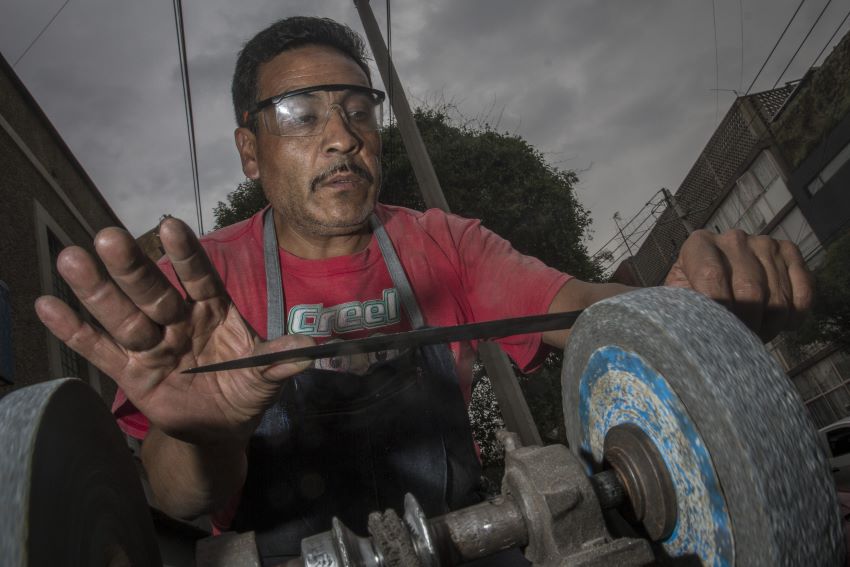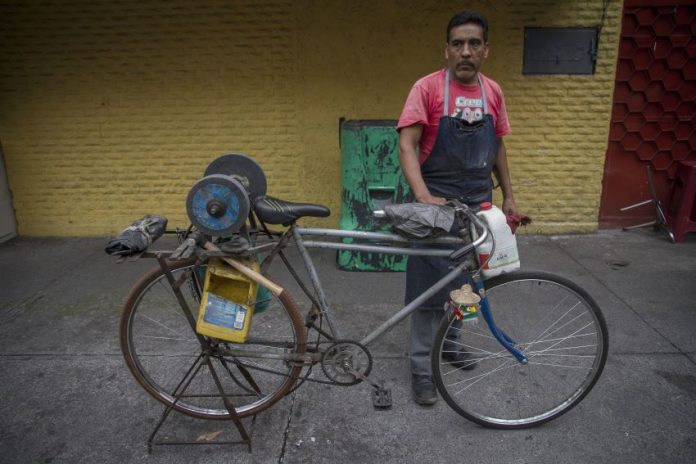If you’ve ever spent time in one of Mexico’s bustling cities, you’ve likely heard the distinct sound of a knife sharpener passing through the street. A shrill, piping sound that announces the arrival of an artisan ready to make your knives and other industrial instruments useful once again. Knife sharpeners are part of a group of specific jobs that not only provide valuable services but also contribute in a significant way to Mexico’s street and neighborhood culture.
Knife sharpening, like many other traditional jobs, forms a part of Mexico’s informal economy. These professions are often heralded by specific tunes, making it easy for residents to identify them from inside their homes or high up in apartment buildings. As the world modernizes, these jobs are unfortunately increasingly obsolete and slowly disappearing. Sounds that once filled the air multiple times a day are now heard perhaps only once a week.

Quintessential to this disappearing trade, knife sharpeners go through the city atop a bicycle, which serves not only as their mode of transportation but also as an indispensable part of their toolkit. Different from other bicycles, those used by knife sharpeners are equipped with a metallic structure that elevates the back tire off the ground, keeping the bike stationary. The back wheel, when elevated and pedalled in place, powers a grinding wheel of stone or metal that sharpens knives, scissors, and other tools. This results in a portable and effective setup that enables knife sharpeners to travel across whole cities on the same day.
The accompanying sound to these artisans’ presence emanates from an instrument known in Mexico as a “caramillo.” This flute-like instrument dates back to medieval times, is also known in other Spanish-speaking countries as chifre, chiflo, or flauta de pan.
Originally made from wood or cane, the caramillo is now often crafted from plastic. The sound that comes out of it is more than just a call to customers; it is a cultural marker and one of the many distinctive sounds of the Mexico City streets. For many, it is also a comforting reminder of the enduring presence of traditional trades amidst the rapid pace of modern life.
It’s very simple to use a knife sharpener’s services and renew some of your commonplace kitchen and household items. Once you hear a caramillo, all you need to do is walk outside into the street with whatever item needs sharpening. Price is set by each artisan and varies, of course.
@mayaenbici Ciclistas que siempre nos harán sentir orgullo 🚲⚔️ #afiladordecuchillos #afilador #ciclistas ♬ sonido original – LA TELE DE AYER
The profession has survived so far, but knife sharpeners are facing significant challenges. The easy availability and disposability of goods, as well as the existence of cheap and mass-produced knives considerably reduce the need and demand for sharpening services. More and more, it seems like the convenience of buying new items often outweighs the “inconvenience” of waiting for a traveling sharpener.
Yet, they persist. Some of these artisans follow the family trade and learn the skills and techniques from family members, keeping the tradition alive from previous generations. One of the most important reasons why they continue, apart from cultural significance, is the environmental benefit of knife sharpening. Renewing and re-sharpening your knives contributes to reducing waste and promoting sustainability. In an era of increasing environmental consciousness, the wait for the sound of a caramillo passing through your street instead of a trip to a hardware store could just well be worth it.
If you look closely, knife sharpeners are much more than their trade, their bicycle or their caramillo. Upon further examination, they can tell you much about Mexico, its people, and its culture. They are a representation of a culture whose necessity is quickly transformed into resourcefulness and adaptability in a way that is valued highly enough to stave off modernity.
Whether you have a sharpening need or not, next time you hear a sharpener passing by, take a moment to appreciate the cultural significance of this craft. Think about how they connect neighborhoods, and how, as they continue to navigate the streets and sharpen the streets of Mexico, they preserve a slice of history — reminding mexicans and the rest of the world the value of tradition in an ever-changing world.
Montserrat Castro Gómez is a freelance writer and translator from Querétaro, México.
